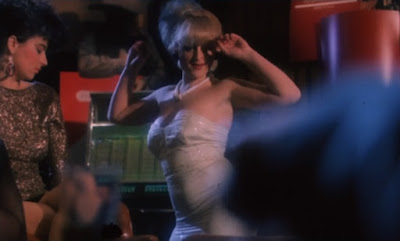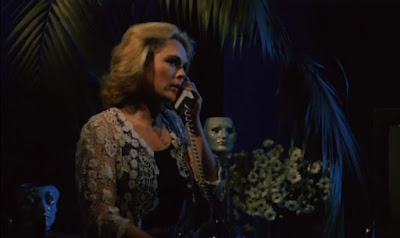... aka: Mám ráda netopýry
... aka: Szeretem a denevéreket
... aka: Wenn Vampire lieben (When Vampires Love)
Directed by:
Grzegorz Warchoł
Izabela (Katarzyna Walter) has been raised from a young age by her weak-hearted aunt (Malgorzata Lorentowicz) and works at her curio shop. Though she's attractive, of age and certainly wouldn't be short of options, the virginal Izabela has thus far resisted dating let alone settling down, despite her auntie's insistence that she needs to get married before it's too late. Izabela claims to prefer her life of solitude and living alone and doesn't care what anyone thinks about that nor about the threat of one day becoming an old spinster. The attentive Marceli (Edwin Petrykat), who's recently been pursuing her to the point of her needing a restraining order against him, frequently visits the shop, waits outside for her and keeps asking to walk her home at night, only to be rejected time and time again. Sometimes persistence is rewarded, but with Izabela it appears to be a lost cause.
Izabela declining something even as simple as an escort home is especially curious considering there's a serial sex predator / killer roaming around the city who's thus far raped and murdered eight young women nearby. Nevertheless, Izabela insists she can handle herself and leisurely walks through a dark park every single night by herself; the same park where numerous victims have been discovered. Does she have a death wish or something? Nope. When she says she can handle herself she really means it. When the killer tries to attack her, she's easily able to turn the tables on him and kill him. That's one perk of being a vampire.
The roles are reversed when distinguished Rudolf Jung (Marek Barbasiewicz) enters the shop one day and shows an interest in Izabela's hand-made bat-themed tea set yet zero interest in her. That doesn't sit too kindly with the vampiress, who's used to getting attention showered upon her. She's the rejector, not the rejectee. He even passes on her sexual advances. Slapping on a dark wig, sunglasses, heavy make-up and a sexy dress, Izabela stalks Rudolf to a pub and attempts to proposition him again, only for her dream man to inform her that he's not into women. Though he's clearly lying, she leaves with an old pervert who thinks she's a hooker and kills him in his van instead.
Izabela ends up killing her wannabe suitor Marceli after he breaks into her home and attempts to kill her for continually turning him down. Then, seeing a news story about Rudolf on TV and learning that he's a famous psychiatrist, she goes to his massive, luxurious castle-like clinic (really the grand Pałac w Mosznej) and checks herself in as a patient. While she openly confesses to the professor and a few other staff members that she's a vampire, nobody believes her, so she starts telling other patients she's being treated for nymphomania instead. Some of the other nuts being treated there include a painter working on a gigantic canvas who's paranoid that everyone is spying on him and a frantic guy who believes x-rays cause AIDS.
Dr. Schulz (Wiktor Grotowicz), whose specialty is hypnosis, is unable to ever put Izabela to sleep, while an attempt at an x-ray has her turning up invisible. Eventually, she seduces, kills and feeds on the man-whore gardener, who's been sleeping with all of the nurses at the facility, and then hides his body in a pile of manure. Once it's discovered, she confesses to the professor that she murdered him yet he still won't take her seriously. She then willingly just leaves the hospital.
While this maintains interest up to this point, unfortunately the film completely falls apart in the third act. After leaving the clinic, Izabela makes an over-the-top jovial (and extremely annoying) gag prop salesman in a toupee keel over from a heart attack by flashing her fangs at him at a costume ball. She then attempts to commit herself to some kind of experimental psychiatric clinic run by Professor Wolf (played by the director), where criminally insane patients are kept caged out in the open air on the beach (?) Finally, we zip through Izabela's "cure" when the psychiatrist decides to finally have sex with her (I suppose that's a unique enough treatment method) and she's finally able to settle into a "normal" life.
This particular vampire has no issue with daylight, garlic, crucifixes, stakes, silver, holy water or anything of the sort. She also doesn't possess great strength, nor can she turn into a bat (though she has pet bats at home), nor can she turn others into vampires, nor is there any indication she's ageless or immortal. She's simply among us drinking blood from time to time. Like many film vampires, she's sick of actually being a vampire but, unlike other doom-ridden vamps who seem to hope for death to end their curse, here she simply wants to change her ways so she can blend into society and experience normal humanly pleasures like sex, love and motherhood.
On the plus side, the film is well-shot, the acting (particularly the female lead) isn't bad and there's some visual style. As a warning to horror / vampire fans, much more of an emphasis placed on the drama and comedy here than on the horror. In fact, this is almost entirely blood, violence and action free. Most of the time, it doesn't even attempt to be scary or suspenseful.
I've no issue with vampirism being used metaphorically, and I always welcome deviations from standard vampire lore, but the characters here are all unlikable, hideously self-absorbed and not really all that interesting. We get approximately zero backstory on the protagonist and little more on the male lead. The fact we could care less about any of these people renders the dramatic elements ineffective, as does the fact any serious content is constantly being undercut by hit-or-miss humor. Also having a "feminist" heroine who spends the bulk of her screen time pestering / stalking a guy and trying to suppress who she truly is, and her individuality, to ease herself into a housewife position to a wealthy career husband, is bizarre to put it mildly. Of course, this also could be an attempt at commentary about how women - even bloodsucking ones - feel compelled to change to fit into a certain expected societal mold, but it's too muddled and missing the kind of sharp, insightful satirical edge that could have made it memorable.
In addition to Poland, this was also released theatrically in Czechoslovakia, Germany and Hungary. It was made widely available here in America for the very first time in 2022 thanks to the 4 disc Severin Blu-ray set "House of Psychotic Women Rarities Collection." The set also includes Identikit aka The Driver's Seat (1974) starring Elizabeth Taylor, Footprints aka Primal Impulse (1974) starring Florinda Bolkan and the British experimental film The Other Side of the Underneath (1972), which is yet another feminist offering, this time from a female director.
★★

































2 comments:
Great review :-)
Thank you so much.
Post a Comment